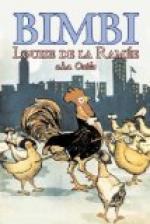It was of great height and breadth, with all the majolica luster which Hirschvogel learned to give to his enamels when he was making love to the young Venetian girl whom he afterwards married. There was the statue of a king at each corner, modeled with as much force and splendor as his friend Albrecht Durer could have given unto them on copperplate or canvas. The body of the stove itself was divided into panels, which had the Ages of Man painted on them in polychrome; the borders of the panels had roses and holly and laurel and other foliage, and German mottoes in black letter of odd Old World moralizing, such as the old Teutons, and the Dutch after them, love to have on their chimney-places and their drinking cups, their dishes and flagons. The whole was burnished with gilding in many parts, and was radiant everywhere with that brilliant coloring of which the Hirschvogel family, painters on glass and great in chemistry, as they were, were all masters.
The stove was a very grand thing, as I say; possibly Hirschvogel had made it for some mighty lord of the Tyrol at that time when he was an imperial guest at Innspruck, and fashioned so many things for the Schloss Amras and beautiful Philippine Welser, the burgher’s daughter, who gained an archduke’s heart by her beauty and the right to wear his honors by her wit. Nothing was known of the stove at this latter day in Hall. The grandfather Strehla, who had been a master-mason, had dug it up out of some ruins where he was building, and, finding it without a flaw, had taken it home, and only thought it worth finding because it was such a good one to burn. That was now sixty years past, and ever since then the stove had stood in the big, desolate, empty room, warming three generations of the Strehla family, and having seen nothing prettier, perhaps, in all its many years than the children tumbled now in a cluster like gathered flowers at its feet. For the Strehla children, born to nothing else, were all born with beauty; white or brown, they were equally lovely to look upon, and when they went into the church to Mass, with their curling locks and their clasped hands, they stood under the grim statues like cherubs flown down off some fresco.
“Tell us a story, August,” they cried in chorus, when they had seen charcoal pictures till they were tired; and August did as he did every night pretty nearly—looked up at the stove and told them what he imagined of the many adventures and joys and sorrows of the human being who figured on the panels from his cradle to his grave.
To the children the stove was a household god. In summer they laid a mat of fresh moss all round it, and dressed it up with green boughs and the numberless beautiful wild flowers of the Tyrol country. In winter all their joys centered in it, and scampering home from school over the ice and snow they were happy, knowing that they would soon be cracking nuts or roasting chestnuts in the broad ardent glow of its noble tower, which rose eight feet high above them with all its spires and pinnacles and crowns.




